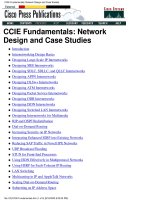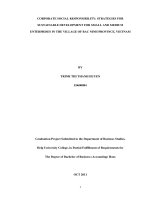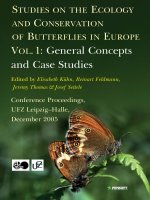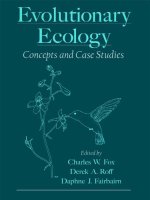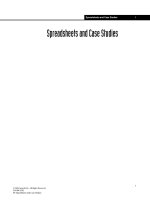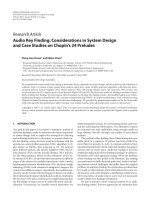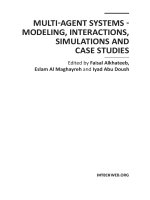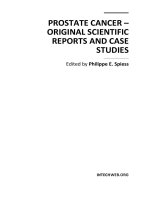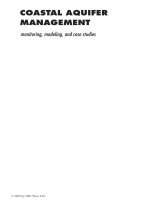Sustainable development principles, frameworks, and case studies social environmental sustainability 2010
Bạn đang xem bản rút gọn của tài liệu. Xem và tải ngay bản đầy đủ của tài liệu tại đây (1.64 MB, 225 trang )
SUSTAINABLE
DEVELOPMENT
Principles, Frameworks, and Case Studies
Edited by
Okechukwu Ukaga, Chris Maser,
and Mike Reichenbach
© 2010 by Taylor and Francis Group, LLC
CRC Press
Taylor & Francis Group
6000 Broken Sound Parkway NW, Suite 300
Boca Raton, FL 33487-2742
© 2010 by Taylor and Francis Group, LLC
CRC Press is an imprint of Taylor & Francis Group, an Informa business
No claim to original U.S. Government works
Printed in the United States of America on acid-free paper
10 9 8 7 6 5 4 3 2 1
International Standard Book Number: 978-1-4398-2062-9 (Hardback)
This book contains information obtained from authentic and highly regarded sources. Reasonable efforts
have been made to publish reliable data and information, but the author and publisher cannot assume
responsibility for the validity of all materials or the consequences of their use. The authors and publishers
have attempted to trace the copyright holders of all material reproduced in this publication and apologize
to copyright holders if permission to publish in this form has not been obtained. If any copyright material
has not been acknowledged please write and let us know so we may rectify in any future reprint.
Except as permitted under U.S. Copyright Law, no part of this book may be reprinted, reproduced, transmitted, or utilized in any form by any electronic, mechanical, or other means, now known or hereafter
invented, including photocopying, microfilming, and recording, or in any information storage or retrieval
system, without written permission from the publishers.
For permission to photocopy or use material electronically from this work, please access www.copyright.
com ( or contact the Copyright Clearance Center, Inc. (CCC), 222 Rosewood
Drive, Danvers, MA 01923, 978-750-8400. CCC is a not-for-profit organization that provides licenses and
registration for a variety of users. For organizations that have been granted a photocopy license by the
CCC, a separate system of payment has been arranged.
Trademark Notice: Product or corporate names may be trademarks or registered trademarks, and are
used only for identification and explanation without intent to infringe.
Library of Congress Cataloging‑in‑Publication Data
Sustainable development : principles, frameworks, and case studies / edited by
Okechukwu Ukaga, Chris Maser, Mike Reichenbach.
p. cm. -- (Social environmental sustainability)
Includes bibliographical references and index.
ISBN 978-1-4398-2062-9
1. Sustainable development. 2. Environmental economics. 3. Environmental
policy--Social aspects. I. Ukaga, Okechukwu, 1961- II. Maser, Chris. III. Reichenbach,
Mike. IV. Title. V. Series.
HC79.E5S86467 2010
338.9’27--dc22
Visit the Taylor & Francis Web site at
and the CRC Press Web site at
© 2010 by Taylor and Francis Group, LLC
2009030998
Contents
Series Editor’s Note.......................................................................................... vii
Preface..................................................................................................................ix
Okechukwu Ukaga, Chris Maser, and Michael Reichenbach
Acknowledgments......................................................................................... xvii
The Editors........................................................................................................xix
Contributors................................................................................................... xxiii
1. If the GDP Is Up, Why Is the GPI Down? From Normative
Debate to Progressive Democratic Economics...................................... 1
Jason Venetoulis
2. Sustainable Development and the Genuine Progress
Indicator: An Updated Methodology and Application in
Policy Settings........................................................................................... 17
John Talberth and Clifford Cobb
3. Refining the Ecological Footprint......................................................... 57
Jason Venetoulis and John Talberth
4. Learning by Experiencing: Systemics,€Futures Thinking, and
Scenarios.................................................................................................... 95
Richard Bawden and Michael Reichenbach
5. Using Lean Thinking Approaches to Speed Sustainable
Development.............................................................................................115
James R. Sinton
6. Working Together to Sustain Local Economy, Environment,
and Community: The University of Minnesota Regional
Sustainable Development Partnerships............................................ 135
Kathy Draeger, Linda Ulland, Okechukwu€Ukaga,€and
Michael€Reichenbach
7. The Holistic Management Framework: Ensuring Social,
Environmental, and Economically Sound Development............... 149
Allan Savory and Jody Butterfield
v
© 2010 by Taylor and Francis Group, LLC
vi
Contents
8. Taking Personal Action toward Sustainability................................ 177
Viviane Simon-Brown and Chris Maser
9. Participatory Leadership for Sustainable Development................ 187
Okechukwu Ukaga, Charles Moumouni, Michael Reichenbach, and
Chris Maser
Index................................................................................................................. 201
© 2010 by Taylor and Francis Group, LLC
Series Editor’s Note
We (Okechukwu Ukaga, Chris Maser, and Michael Reichenbach) have
come together out of a sense of trusteeship for the generations of children
of today, tomorrow, and beyond to create a book that will help protect for
them a future of good quality.
The purpose of our book is to frame in the positive some of the most
important, human-related aspects of sustainable development. There
is great power in learning to think in a positive mode. In so doing,
members of a community can create a shared vision whereby they not
only understand their community from several vantage points, but
also understand that much of the confusion in communication comes
from trying to move away from negatives. Trying to move away from a
negative precludes people from saying what they really mean because
they are focused on what they do not want. As long as people express
what they do not want, it is virtually impossible to figure out what they
do want because they are “symptomatic” in their thinking as opposed
to “systemic.”
In other words, we continually focus on and attempt to treat the symptoms of today’s emerging global crises, but we refuse to deal with the
cause—which in part is the opulence of our Western industrial lifestyle.
These crises include a warming climate, per-capita shrinking of natural resources due to a human population that is rapidly exceeding the
global carrying capacity, and the ever-growing disparity between the rich
and poor peoples and nations. We cannot, however, move away from an
unwanted, negative circumstance. We can only move toward a desired,
positive outcome.
To help us elucidate our common journey toward a positive future for
all generations, we have invited distinguished practitioners and scholars
to contribute their expertise to help reveal the multidimensional nature
of sustainable development. Their approaches include strong theoretical
and historical pieces as well as salient case examples, which illustrate the
outcome of each model or framework.
Chris Maser
Series Editor
vii
© 2010 by Taylor and Francis Group, LLC
Preface
Okechukwu Ukaga, Chris Maser, and Michael Reichenbach
An environmental disaster may be looming within many of our readers’
lifetimes and certainly within the lifetime of the next generation. The full
impacts of Earth climate change are not known, nor can they be known.
Carbon emissions are linked to Earth warming, the impacts of which
include rising oceans, flooded coastlines, changes to where and how we
grow our crops, and changes in the ecology of the planet. As we write this
in the summer of 2009, the Earth economic system is in the process of correction. While we will, as in the past, recover from this latest downturn, it
is yet another powerful reminder that economic growth cannot continue
indefinitely. To be sustainable, all societies must adjust to new realities,
which include changing ecosystems and natural limits to growth. How
do we address these issues and maintain an equitable way of life for all
on the planet? The solutions are embedded in the principles of sustainable
development. Hence, this book presents frameworks and cases that have
been used or could be used to address impacts of climate change, challenging economic conditions, social problems, and other complex issues
related to our future.
While the basic idea behind sustainable development is not new, especially among traditional or indigenous societies, the present-day concept of
sustainability can be traced to the United Nations Conference on Human
Environment, held June 5–16, 1972, in Stockholm, which highlighted
the link between the environment and development in the Earth arena
(United Nations General Assembly 1972, 148). The World Commission on
Environment and Development (1987, 383) further catalyzed the Earth conversation about sustainable development, which it defined in their publication Our Common Future as “development that meets the needs of the
present without compromising the ability of future generations to meet
their own needs.” This recognizes the complex interrelationships among
the environment, people, and development, as well as the past, present,
and future generations.
Sustainability, itself a transcendent term, is an ideal toward which we
strive and not an endpoint. It has many interrelated dimensions (e.g., ecological, economic, social, political, and epistemological) and calls for a
participatory, holistic, interdisciplinary approach to program planning,
implementation, and evaluation. Sustainable development requires the
ix
© 2010 by Taylor and Francis Group, LLC
x
Preface
freedom to openly discuss, challenge, and debate ideas and perceptions
as points of greater learning, as opposed to blind defenses of entrenched
positions. Sustainable development also requires the ability to think about
systems and their interaction. Sustainable development is created anew in
the eternal moment of every day, and thus is an ideal toward which we
strive that cannot be realized as a given point in time. Working toward
this vision is a challenging task—one that requires not only serious
effort, but also appropriate tools and systems for moving effectively from
improved awareness, interest, knowledge, attitude, and skills to practical
steps toward sustainability. In other words, those interested in fostering
sustainable development will benefit greatly from concrete ideas of what
can be done on the ground to meet critical needs.
There is an African proverb that states: It takes a village to raise a child.
This maxim holds a truth that extends well beyond the village. Namely,
for a village to be healthy, it requires a unifying and holistic factor to integrate the myriad interactive components into a functional whole. And that
unifying factor can be the concept of sustainable development.
If we were to ask ourselves what it would take to design a sustainable
community, country, or world, we would find ourselves engaging the
whole system (instead of a few parts) over the long term (instead of the
short run). Moreover, for life, human or otherwise, to have any measure
of good quality, the basic components of long-term sustainability of the
Earth commons must be given the highest priority: from clear air, to pure
water, healthy oceans, fertile soils, and healthy food, to asking the children what kind of future they want their parents—as trustees—to protect
for them as a legacy from one generation to the next.
What, you might ask, is meant by the “Earth commons?” The commons
is that part of the world that is every person’s birthright. As such, there
are two kinds of commons. Some are gifts of nature, such as clean air,
pure water, fertile soil, a rainbow, a beautiful sunset, or a tree growing in
the middle of a village; others are the collective product of human creativity, such as the town well from which everyone draws water. The commons provides the basic ecological and social support systems of life and
well-being. It’s the vast realm of our shared heritage, which we typically
use free of toll or price. Air, water, and soil; sunlight and warmth; wind
and stars; mountains and oceans; languages and cultures; knowledge and
wisdom; peace and quiet; sharing and community; joy and sorrow; and
the genetic building blocks of life—these are all aspects of the commons.
A commons has an intrinsic quality of just being there, without formal
rules of conduct. People are free to breathe the air, drink the water, and
share life’s experiences without a contract, without paying a royalty, without needing to ask permission. As such, a commons engages people in the
wholeness of themselves and in community. It fosters the most genuine
of human emotions and stimulates interpersonal relationships in order
© 2010 by Taylor and Francis Group, LLC
Preface
xi
to share the experience, which enhances its enjoyment and archives its
memory. We humans have jointly inherited the commons, which is more
basic to the quality of our lives than either the market or the state. We are
“temporary possessors and life renters,” wrote British economist and philosopher Edmund Burke, and we “should not think it amongst [our] rights
to cut off the entail, or commit waste on the inheritance.”1
The foregoing leads us to the problem we face today, which is the
myth of limitless resource. It is time we shift our defiance of limits to an
embrace of “enoughness.” All nations—but especially the wealthy, industrialized nations—must now consciously accept and openly display their
social responsibility by placing personal and national limits on material
appetites, which means separating need from want, and thereby learning
when enough is, in fact, enough. As such, limits and enoughness are not
only the bedrock of sustainability, but also its two most widely ignored
components. There is, after all, no such thing as absolute personal or
national freedom in anything. All choices have consequences for which
we are responsible, a condition from which no one can escape.
By analogy, consider that you are grossly overweight and your doctor
tells you to lose fifty pounds or risk the certainty of a fatal heart attack.
You think about what the doctor said and decide that you must go on
a strict diet, which you do. As a result, you lose ten pounds in a week,
and you are amazed at how easy it is. The next five pounds requires two
weeks to shed, and another ten requires a month. Although thrilled at losing twenty pounds, which makes you feel much better about yourself, you
refuse to give up your old, comfortable, sedentary lifestyle. Then, much to
your dismay, the weight begins once again to accumulate, until you are
back where you started.
Clearly, the initial weight loss was but a temporary fix of a symptom,
which is why you went to your doctor in the first place. However, as the
doctor admonished, you have to fundamentally change your lifestyle not
only to reduce all your excess weight, but also, and more importantly,
to keep it off. That, however, was not what you wanted to hear, so you
resisted that part of the prescription. Finally, with your health permanently at stake, you go back to your doctor and, together, create a plan
that will allow you to alter your lifestyle in relatively nonthreatening
steps over a given period of time. And that is what we are prescribing in
this book—a plan that begins with an appropriate assessment and understanding of prevailing conditions, learning from the many examples of
sustainable development processes and practices that can be applied to
your own situation, and personal decisions and leadership that gradually
extend to a community, then a region, a state, a nation, and ultimately to
the world. Here, it must be understood that it is necessary to accept every
step toward sustainability, however small, as a vital, positive contribution
to the whole.
© 2010 by Taylor and Francis Group, LLC
xii
Preface
We, the peoples of the Earth, must find ways to work together to raise
the level of our collective consciousness to sustain the dignity of being
human. Sustainable development is not about maintaining a good quality of life for just one generation, but rather about passing the ability to
realize a good quality of life from generation to generation. Our quality
of life is a construct of our existence. Each generation—as a trustee for
the next generation—is charged with passing forward the intact principle
of the trust. Increasing the quality of life is not a promise of sustainable
development. While we may desire that our quality of life increase, we
need to also be committed to ensuring equity in meeting all peoples’ basic
requirements—present and future.
We, therefore, begin the text with discussions about valuation. The concept of valuation is important since people need to understand the context
in which they are working in order to figure out what they need to change
or sustain and how. In his contribution entitled “If the GDP Is Up, Why
Is the GPI Down?” Venetoulis highlights the disconnect between gross
domestic product (as a measure of economic well-being) and true socialenvironmental welfare. The chapter demonstrates how genuine progress
indicators (GPIs) respond to the theoretical and practical defects inherent in
the gross domestic product as a measure of economic sustainability, making genuine progress indicators a more honest way to inform public policy
with respect to such things as globalization, tax cuts, and urban sprawl.
In Chapter 2, Talberth and Cobb present the conceptual framework,
methods, and results for the 2006 update of the genuine progress indicator (GPI) for the United States. The genuine progress indicator is one of the
first alternatives to gross domestic product vetted by the scientific community and used regularly by government and nongovernmental organizations worldwide. The GPI’s structure is grounded in the principles of
sustainable development, which call for (1) no net loss of natural capital,
(2) welfare-based accounting, (3) distributional equity, and (4) throughput
minimization. The genuine progress indicator relies on the same personal
consumption data as the gross domestic product, but makes deductions to
account for costs associated with negative factors, such as income inequality, crime, environmental degradation, loss of leisure, and international
borrowing; and additions reflecting the value of services from consumer
durables, public infrastructure, volunteering, housework, and ecological
restoration. The genuine progress indicator suggests that, while the scale
of U.S. economic activity has grown steadily since 1950, our collective welfare may have peaked in the late 1970s and stagnated ever since, as the
benefits of economic growth since that time have been offset by increasing income inequality, costs associated with climate change, depletion of
forests and farmland, and a worsening international position.
Chapter 3, by Venetoulis and Talberth, clarifies the definition of ecological footprint applications and proposes several methodological and
© 2010 by Taylor and Francis Group, LLC
Preface
xiii
theoretical refinements. Their new approach includes the biological
capacity of the entire surface of the Earth, allocates space for other species, changes the basis of equivalence factors to net primary productivity
(NPP), reallocates the carbon budget, and reports biological capacity of
carbon sequestration. The ecological footprint measures how much of the
biosphere’s annual regenerative capacity is required to renew the natural
resources used by a defined population in a given year.
In Chapter 4, Bawden and Reichenbach present systemic and futures
thinking as a way to transform our worldviews. The chapter is concerned
with social learning and how viewpoints held by individuals influence
both individual and group actions toward sustainability.
Critical scenario learning for systemic development uses scenario learning as a tool to move groups toward sustainable development. It is the
antithesis of the typical approach to planning, where effort is placed on
trying to create a desired future condition. The chapter asserts that we do
not always have the control needed to create that desired future condition;
thus, we need to envision a variety of futures, create a rich and rigorous
prehistory for each, and use what is learned to test our current strategies. This framework utilizes a social process of reflexive, experiential,
and transformational learning. For the framework to be used, participants
must be able to recognize other viewpoints and allow those viewpoints
to be challenged. The underlying assumptions for the framework are
described. A case is provided illustrating how participants in the process
learn their way toward sustainable development (i.e., the restoration of
coniferous forests along the North Shore of Lake Superior).
We can use our unique ability as human beings to perceive multiple
futures, examine them, explore viewpoints, and learn from the experiences. Future learning requires one to be mindful of systemic connections
between ourselves, as humans, and the natural and social environments
in which we are embedded. It is a mentally challenging process that leads
to personal development as the essential prerequisite for sustainable social
and material development.
As a central theme of this book, sustainable development is about raising our collective level of consciousness to the point where we can move
steadily toward sustainability. In this sense, sustainability is an ethos or
context from which we each strive to leave the world a little better for having been here.
The biggest challenge facing society today is the shift in paradigm
demanded by ecological decision making. This transformation demands
both wide-scale training and a reorientation of the direction that organizations and communities have been taking. In Chapter 5, Sinton suggests
that sustainable Lean thinking offers the social transformation tools and
processes needed to bring these about. The concept of using Lean thinking approaches to speed sustainable development reflects the following
© 2010 by Taylor and Francis Group, LLC
xiv
Preface
sustainable development principles: (1) integration of environmental criteria decision-making processes, and (2) making best use of local efforts
(ORTEE 1994). The optimal utilization of local efforts and resources has
emerged as one of the strongest organizing principles available to us for
transforming to a sustainable society. Popular movements in the United
States, like the Buy Fresh Buy Local campaign and the Business Alliance
for Local Living Economies, reflect the suitability of this approach. Lean
thinking applies rules that foster this approach by minimizing the movement of material and people.
The compounding actions of individuals, who, being of like mind, act
in accord and can elevate the underpinnings (social values) of the current paradigm. Such actions, while often aimed at solving an immediate
problem by attacking its symptoms (the case examples), form the requisite
pieces that, when integrated, begin to build a systemic way of understanding and engaging sustainability (the interactive framework).
The Minnesota Regional Sustainable Development Partnerships, discussed in Chapter 6 by Draeger, Ulland, Ukaga, and Reichenbach, is a
great example of community-university engagement, which not only
builds on the successful land-grant tradition of applying the university
research and outreach resources to local issues, but also aspires to reinvent the land-grant ideal to meet the challenges of the twenty-first century. The Sustainable Development Partnerships serves as a framework
from which to build on the compact between society and public institutions. This involves local community representatives and university
personnel working together to develop and implement community-based
partnership projects. The ideal outcome is a partnership that provides
critical resources for community-based initiatives while creating learning experiences for citizens and the university. The Regional Sustainable
Development Partnerships combines citizen leadership with the research
and educational resources of a public institution to foster long-term
regional sustainability.
In Chapter 7, Savory and Butterfield discuss the holistic management
framework, based on the assumption that sustainable development rests on
a sustainable agriculture, which in turn is impossible to achieve if land is
degrading. The chapter notes that the symptoms resulting from land degradation, including desertification, are exploding exponentially: increasing frequency and severity of droughts and floods even without change in
rainfall; massive invasions of noxious plants and insects; poverty; violence,
including abuse of women and children, as populations exceed declining
resources; genocide; and, of course, migration from rural areas to cities.
Because the only form of wealth that can sustain a nation is derived from
the photosynthetic process, in which green plants convert solar energy
to usable forms, including food, any attempt to sustain development that
does not address land degradation will always be short-lived.
© 2010 by Taylor and Francis Group, LLC
Preface
xv
The point is that no matter how many millions of dollars are invested in
development projects in Africa and elsewhere, there is little hope of sustained success unless two requirements are funded and met. First, education must empower the people themselves, as the only experts on their
culture and situation, to actually reverse land degradation and desertification. Second, women must be educated and empowered as equals to
men. As long as women remain subservient, improvements in health and
rural livelihoods lead to increased family size, which the resource base
cannot sustain.
Individuals who accept personal responsibility for the consequences
of their thoughts, choices, and actions form the basis of sustainability.
Chapter 8 on sustainable living, by Simon-Brown and Maser, is about
managing ourselves. It is based on identifying the personal values, ethics, and beliefs that underlie decision making. Considering the barriers
to living sustainably, examining national trends, and determining personal priorities are integral components of educating ourselves about
our consumer choices. Notably, at Oregon State University and other
land-grant institutions, educational efforts were focused on teaching students to professionally manage natural resources. However, as
pressures of population, economics, and consumption increase, helping consumers take a thoughtful approach to understanding their
cultural, economic, and environmental ethics and addressing their
responsibilities as consumers of natural resources become viable educational tools.
This chapter points out that sustainable living requires us to manage
the only thing we can manage—ourselves. Self-management is based on
identifying the personal values, ethics, and beliefs that underlie decision
making. Further, the chapter provides insight into (1) barriers to sustainable living, (2) national trends, and (3) personal priorities as integral components of educating ourselves about our consumer choices.
In the conclusion, Ukaga, Moumouni, Reichenbach, and Maser discuss
participatory leadership communication as a tool for facilitating sustainable development. Rather than waiting for all the stakeholders to become
interested and actively involved in a spontaneous fashion, anyone can make
a positive difference by using a “growing spiral of communication” to turn
an individual’s sustainability idea into a community’s idea and action.
Endnote
1. See />html (accessed on October 13, 2008).
© 2010 by Taylor and Francis Group, LLC
xvi
Preface
References
ORTEE. 1994. Ontario round table on the environment and the economy (ORTEE).
Round Table Talk, Summer.
United Nations General Assembly. 1972. Report of the United Nations Conference on
the Human Environment held at Stockholm, 5–16 June 1972. A/CONF.48/14.
New York: United Nations General Assembly.
World Commission on Environment and Development. 1987. Our common future.
Oxford: Oxford University Press.
© 2010 by Taylor and Francis Group, LLC
Acknowledgments
We thankfully acknowledge Diane Seefeldt for her help in proofreading
and formatting the manuscript. We are also very grateful to our respective families for their support.
xvii
© 2010 by Taylor and Francis Group, LLC
The Editors
Okechukwu Ukaga is the executive director of Northeast Minnesota
Sustainable Development Partnership, University of Minnesota. He is
also an adjunct professor of environmental science at the University of
Minnesota–Duluth and an extension professor of sustainable development
with the University of Minnesota Extension. Before coming to Minnesota,
Dr. Ukaga served as the managing director of the International Institute
for Sustainable Development at Colorado State University. In that capacity, he managed a variety of sustainable community development projects and worked with organizations and people from countries in Africa,
South America, Asia, and the Middle East. He received a PhD in agricultural and extension education from Pennsylvania State University, an MS
in education and an MBA in business from Florida A&M University, and
a postgraduate diploma in agricultural economics from the University of
Nigeria. He has previously taught at Colorado State University, Penn State,
and Florida A&M University. His current professional and research interests are in participatory planning and evaluation of sustainable development at the local, regional, state, national, and international levels.
Dr. Ukaga has served and continues to serve on important domestic and international project teams, for example, the executive board of
the Minnesota Evaluation Association, Minnesota Sea Grant College,
Consortium for Sustainable Village Based Development, and Renewing
the Countryside. He also served as a member of a Kettering Foundationfunded national task force on the practice of public scholarship in landgrant institutions, a member of a European Union-funded international
working group on evaluation of sustainable development, and a consultant for the U.S. Agency for International Development Agribusiness
Development Program (ADP) training in South Africa. His work has
been applied in many parts of the world. Examples include evaluation of
Regional Sustainable Development Partnerships in Minnesota, planning
and evaluation of the extension service program of several universities in
Indonesia, HELPO Foundation’s rural development project in India, ecotourism and sustainable development in Senegal, promoting sustainable
cities in New Zealand, UNICEF’s country-led monitoring and evaluation
systems across the world, developing a sustainability policy model for promoting cleaner production (CP) in Korea, assessment of coastal resources
utilization and environmental management in Xinhui Coastal District of
Gunagdong Province, China, and development of indicators for Sustainable
Urban Brownfield Regeneration Integrated Management consortium case
study sites in Manchester and Barking in Essex, United Kingdom.
xix
© 2010 by Taylor and Francis Group, LLC
xx
The Editors
Dr. Ukaga has written or coauthored over fifty publications, including books, a special edition of a scholarly journal, book chapters, journal articles, conference papers, and project reports. His book Renewing
the Countryside (2001, coedited with Jan Joannides, Sara Bergan, Mark
Ritchie, and Beth Waterhouse) highlights the success stories of people
across Minnesota’s diverse and beautiful landscape who are conserving and enhancing the state’s natural and cultural resources while spurring local economic and community development. Evaluating Sustainable
Development (2004, coauthored with Chris Maser) presents the principles
and tools for participatory planning and evaluation of sustainable development. Sustainable Development in Africa (2005, coedited with Osita Afoaku)
examines factors limiting sustainable development in Africa and offers
reasoned suggestions on practical strategies for achieving development
in Africa that is anchored on the values of sustainability, appropriateness,
and equity. His latest book, Sustainable Development: Principles, Frameworks,
and Case Studies (coedited with Chris Maser and Mike Reichenbach), summarizes selected sustainable development models, and includes not only
theoretical pieces, but also salient case examples.
Chris Maser has spent over twenty-five years as a research scientist
in natural history and ecology in forest, shrub steppe, subarctic, desert, coastal, and agricultural settings. Trained primarily as a vertebrate
zoologist, he was a research mammalogist in Nubia, Egypt (1963–1964),
with the Yale University Peabody Museum Prehistoric Expedition, and
a research mammalogist in Nepal (1966–1967), where he participated in
a study of tick-borne diseases for the U.S. Naval Medical Research Unit 3
based in Cairo, Egypt. He conducted a three-year (1970–1973) ecological
survey of the Oregon Coast for the University of Puget Sound, Tacoma,
Washington. He was a research ecologist with the U.S. Department of the
Interior, Bureau of Land Management for thirteen years (1974–1987)—the
last eight studying old-growth forests in western Oregon—and a landscape ecologist with the Environmental Protection Agency for one year
(1990–1991). From 1992 to the present, he has been helping to reshape the
thinking on social-environmental sustainability; to that end, he was the
editor and author of a series on books on various facets of sustainability.
Today Chris Maser is an independent author as well as an international
lecturer and facilitator in resolving environmental conflicts, vision statements, and sustainable community development. He is also an international consultant in forest ecology and sustainable forestry practices, and
has written over 275 publications—including 28 books. His books are in
academic and public libraries in every state in the United States and all but
one province in Canada, as well as sixty-four other countries. (For more
information, see his website: />© 2010 by Taylor and Francis Group, LLC
The Editors
xxi
Michael R. Reichenbach is an educator and advocate for sustainability and environmental issues. During the environmental movement of
the 1970s, he helped organize the first community recycling program in
the Village of Oak Park, Illinois. He studied forestry at the University of
Illinois, receiving a BS in forestry in 1978 and an MS in forestry in 1984.
As a business owner working to protect natural resources and trees during development, he found ways to work with developers to achieve both
economic and environmental goals. He has worked as a natural resource
educator—five years for The Oregon State University and ten with the
University of Minnesota Extension. He served as the associate director of
the University of Minnesota Northeast Minnesota Regional Sustainable
Development Partnership for one year. Currently he is a full time extension forestry educator at the University of Minnesota and is pursuing an
Ed.D. in teaching and learning at the University of Minnesota Duluth
College of Education.
As an educator, he organized, facilitated, or presented at more than 250
workshops, conferences, or training seminars. He provided leadership for
developing and presenting educational programs on economic development, forest management, business practices, and sustainable forestry.
His interest in increasing citizen involvement and understanding of sustainable development is rooted in learning about others’ sense of place
and how their viewpoints shape our world.
© 2010 by Taylor and Francis Group, LLC
Contributors
Richard Bawden was, for many years, dean of agriculture and rural development at Hawkesbury College in Australia, during which time that institution pursued an ambitious systems-based approach to education and
research. In 2000, after twenty years at that college, Dr. Bawden accepted a
position at Michigan State University as a visiting distinguished university
professor—from which he retired in 2007. He still teaches, consults, and is a
guest lecturer on sustainable development and the need to understand our
own worldviews.
Jody Butterfield is a former journalist specializing in agriculture and
the environment. She is a cofounder of the Africa Centre for Holistic
Management and serves on its board of trustees.
Clifford Cobb has served since 1994 as a senior fellow at Redefining
Progress (RP), a nonprofit organization in Oakland, California, that advocates alternative methods of economic measurement and environmental
policies based on sound economic principles. At RP, Mr. Cobb developed
the genuine progress indicator (a measure of national economic welfare). Since 1997, Cobb has served in various capacities with the Robert
Schalkenbach Foundation. The foundation promotes the philosophy of
Henry George, best known for his advocacy of the single tax, a tax on the
value of land.
Kathy Draeger is currently the statewide director for the University of
Minnesota Regional Sustainable Development Partnerships (UM Regional
Partnerships). This citizen-driven program connects communities to their
land-grant university to advance sustainable agriculture, natural resources,
renewable energy, and sustainable tourism. Ms. Draeger comes to this
position having founded and run two successful environmentally based
businesses: Environmental Ground, Inc., and Sustainability International,
Inc., the latter of which was bought out by an engineering firm.
Charles Moumouni is an associate professor at the Department of
Information and Communication of Université Laval, Quebec, and a lawyer
registered with the Quebec Bar. He is the vice president of the Théophraste
Network, the institutional network of francophone journalism schools.
He is a member of the scientific committee of the academic agency of the
Francophonie intergovernmental organization (Agence universitaire de
xxiii
© 2010 by Taylor and Francis Group, LLC
xxiv
Contributors
la Francophonie). He is also the coordinator of the UNESCO–Université
Laval joint training program on journalism and world heritage.
Allan Savory is president of the Savory Institute and, with his wife Jody
Butterfield, a cofounder of the Africa Centre for Holistic Management of
which he is chairman of the board of trustees. He pursued an early career
as a research biologist and game ranger in the British Colonial Service
of what was then Northern Rhodesia (today Zambia), and later as a politician, international consultant, farmer, and game rancher in Southern
Rhodesia (today Zimbabwe). He went on to work, as a resource management consultant, with numerous managers, eventually on four continents,
to develop sustainable solutions. Mr. Savory served as a member of parliament in the latter days of Zimbabwe’s civil war and was leader of the
opposition to the ruling party headed by Ian Smith. Exiled in 1979, as
a result of his opposition, he immigrated to the United States. He now
divides his time between Zimbabwe and New Mexico.
Viviane Simon-Brown is an extension forestry professor at Oregon State
University. She coordinates the Sustainable Living Project at Oregon State
University. Its mission is to improve the quality of life and reduce environmental degradation in Oregon by fostering new consumption patterns
and sustainable lifestyles. Since 1998, the Sustainable Living Project at OSU
has been offering off-campus programming on intelligent consumption
to American adults and older youth. Over 7,500 people have participated
in workshops, and over a half-million browsers have visited the website.
Her international work includes research in England, Belgium, Germany,
and India. She is a past president of the Association of Natural Resources
Extension Professionals, and currently directs the National Network for
Sustainable Living Education.
James R. Sinton is an assistant professor in the Departments of Business
Administration and Sustainable Living, at Maharishi University of
Management. He specializes in environmental management, Lean thinking, and sustainable living. Dr. Sinton has combined a career in management consultancy and education. He has spent over twenty years
consulting for executives at large and small corporations, including IBM,
Kodak, Toshiba, Procter & Gamble, and Kellogg’s. This work has covered
three continents: Europe, Africa, and North America.
John Talberth, an ecological economist, directs the Sustainability
Indicators Program at Redefining Progress and coordinates scientific
advances as well as policy applications of sustainability metrics, such
as the genuine progress indicator and ecological footprint. Dr. Talberth
also serves as president and consulting economist with the Center for
© 2010 by Taylor and Francis Group, LLC
